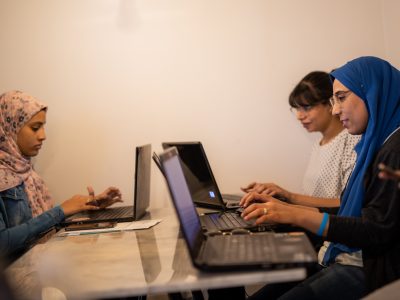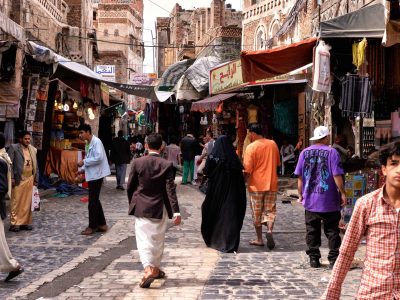
An airstrike in the Yemeni capital Sana'a on 11 May 2015. Photo by Ibrahem Qasim (CC BY-SA 2.0)
The conflict in Yemen, which erupted more than two years ago between Houthi rebels and forces backing the government of President Abdrabbuh Mansour Hadi, has plunged the country into an unprecedented humanitarian crisis. Thousands of civilians have been killed and injured, millions are at risk of famine and in need of humanitarian aid, and a cholera outbreak is killing one person every hour. The conflict worsened when a Saudi led coalition, fueled by US, UK and French arms sales, launched an airstrike campaign in support of the internationally-recognized government of Hadi in March 2015.
Yet, this conflict has come to be known as the “forgotten war“, and what exacerbates the lack of media coverage are the risks journalists and media in Yemen face. At a time when the voices of Yemeni journalists and media are most needed, they are instead being silenced by the different warring parties.
“In light of the war, journalists have been targeted deliberately and systematically because of their work”, Sweden based Yemeni blogger and journalist Afrah Nasser told Global Voices in an e-mail interview.
Only recently, two journalists were killed while covering fighting between the Saudi coalition backed forces loyal to president Hadi and forces loyal to Houthi rebels and former president Ali Abdullah Saleh on the outskirts of Taiz, a city in southwestern Yemen. Takieddin al-Hudhaifi, was a freelance cameraman, while Wael al-Absi worked for the official Yemen TV channel. On 26 May, while on the frontline covering the fighting in eastern Taiz, the journalists came under attack and took cover in a nearby building. According to a journalist who spoke to CPJ, Houthi fighters fired a shell at the building, killing al-Hudhaifi and al-Absi, and injuring two other journalists. CPJ could not confirm whether the journalists were deliberately targeted by Houthi fighters. However, Houthi rebels have a record of human rights abuse and press freedom violations.
“The armed group of Ansar Allah (Houthis) and the forces of the former Yemeni President Ali Abdullah Saleh top the list of violations of press and media freedom in the country,” Taha Yaseen, media and communication officer at the Yemen based Mwatana Organization for Human Rights, told Global Voices. Mwatna documented violations that include arbitrary arrests, enforced disappearances, raids against media offices, the closure and confiscations of newspapers, unfair trials, and the blocking of websites.
Houthis impose Internet censorship
Days after Saudi Arabia began its airstrike campaign against Houthi rebels in March 2015, state-owned Yemen Net, the largest internet service provider in the country, blocked several news and search websites. YemenNet and other government buildings and institutions including the ministry of communication and information have been under the control of Houthi militias since January 2015, making it easy for them to censor and block websites that challenge their narrative.
Blocked websites include online media sites that have been critical of the Houthis and their rights abuses such as Yemen Press and Mareb Press. Later, the Houthis also blocked websites of the Saudi-onwed Al-Arabiya, and the Qatari-owned Al-Jazeera.
A report by the University of Toronto's CitizenLab on information controls in Yemen during the 2015 armed conflict, concluded that Internet filtering products sold by the Canadian company Netsweeper were being used to filter critical political content, independent media websites, and all URLs belonging to the Israeli (.il) top-level domain. According to Mwatna Organization, at least 36 news websites were blocked by YemenNet.
For two years, the Houthis have been arbitrarily detaining nine journalists without charge or trial.
Nine NGOs demand the release of journalists held by Huthi forces for two years https://t.co/k73oXWrOWe pic.twitter.com/m5pxgLJfNb
— Amnesty Gulf (@amnestygulf) June 9, 2017
On 9 June, nine organizations including Amnesty International, Article19 and the Gulf Center for Human Rights (GC4HR), released a joint statement calling for the journalists’ release. According to the statement:
Abdelkhaleq Amran, Hisham Tarmoom, Tawfiq al-Mansouri, Hareth Hamid, Hasan Annab, Akram al-Walidi, Haytham al-Shihab, Hisham al-Yousefi and Essam Balgheeth have been detained since 9 June 2015 when they were arrested by armed men in a room from where they were working in Qasr Al-Ahlam Hotel, Sana’a.
Those who arrested the men were dressed in a mixture of civilian, military and General Security clothing, and some had slogans on their weapons that are associated with the Huthi armed group and its political wing, Ansarullah. According to their families, the men are not aware of the reasons for their continued detention, and have not been formally charged or brought to trial.
In the past, family members told Amnesty International that the detainees told them they overheard guards saying that the nine journalists are being held because they are linked to “terrorism” and “tarnishing the image of the Huthi popular committees”, as well as “working for Saudi Arabia, Qatar, United Arab Emirates, America and Israel.” The journalists work for a variety of news outlets, some of which oppose the Huthi armed group, while others are aligned to the al-Islah opposition political party.
In addition, a tenth journalist Salah al-Qaedi has been in arbitrary detention since 28 August 2015, after Hourthi rebels arrested him at his home. Al-Qaedi worked at Suhayl TV Channel, which is affiliated with Yemen's Muslim Brotherhood, al-Islah party, involved in the fighting against the Houthis. In September 2014, Houthi militias raided the office of Suhay TV before shutting it down in March 2015.
In another disturbing case, a Houthi court in the capital Sana'a, sentenced journalist Yahya al-Jubaihi, in arbitrary detention since September 2016, to death, following what rights groups described as an unfair trial. The prominent 61 year-old writer and journalist was convicted of spying for Saudi Arabia. He contributed to a number of Yemeni and Arabic newspapers, and published articles critical of the Houthi militias.
Yet, Houthis rebels are not the only group responsible for violations against journalists and media. Several journalists were killed by Saudi-coalition airstrikes. On 17 January 2016, freelance journalist Almigdad Mojalli was killed by a Saudi-led coalition airstrike outside the capital Sanaa. Almigdad was on assignment for Voice of America, but he also covered the conflict for The Telegraph and the humanitarian news and analysis agency IRIN. Few days later, 17 year-old cameraman Hashim al-Hamran died in hospital after he was seriously injured by another coalition airstrike. Al-Hamran was reporting for the Houthi-affiliated al-Masirah TV, in the town of Dahyan, in Saada province.
In areas that are under the control of Hadi and his forces, journalists are also targeted, detained and even tortured, Yaseen said. His organisation also documented the kidnapping of at least two journalists by jihadi groups affiliated with the Popular Resistance, formed to defend Taiz against Houthis’ advances.
These violations and pressures are having a disastrous impact on independent media in Yemen and the coverage of the war.
“There is no independent media covering the reality of the situation in Yemen”, Fatima al-Aghbari, a Yemen based editor at the Yemeni Media Center, who covers politics and human rights, told Global Voices. She adds:
الاعلامي ان وجد في منطقة يصبح مثير للشك ويمكن ان يتعرض للخطر مالم ينقل ما يريده اي طرف من الاطراف
If there is a journalist in one area, he/she raises suspicions and could be at risk unless they report what any party from the [warring] parties would like to see reported
For Nasser, the war's coverage has turned into a “battle-zone”. She says:
Each side in the war portraits only its “truth” [and its] totally incomplete picture of the situation. As a result, you find a great deal of war propaganda. No middle ground for any other type of media; local independent press suffers a great deal and it has collapsed.
In a statement published on the occasion of Word Press Freedom Day, Mwatana warned that press freedom in Yemen is facing “eradication”:
the continuation of systematically violent and repressive practices against journalists and their institutions and means would lead to the extinction of the profession of journalism and the elimination of the remaining margin of freedom of expression that existed in Yemen before the war.
As there is no end in sight to the war in Yemen, journalists will continue to face risks that threaten their safety and freedom. Even if the war ends today, the country will be left to deal with collapsed state institutions, making any investigations into human rights abuse and press violations, a difficult task. This is of course, if whoever is going to seize political power, will be willing to impartially investigate such abuses. If not, violations will very like continue to happen.
However, Yemeni journalists do not have to fight this battle on their own. International organizations working to promote press and media freedoms can offer support, Yemeni activists and journalists told Global Voices. These organizations can “shed light on the distress the Yemeni journalists are facing and make their voices heard to the world”, said Yaseen from Mwatana. “It’s very important to give these journalists the attention while they are alive not when they are killed or arrested”, Afrah Nasser said. She adds:
The attention that these local journalists could get while they are alive could really give them a sort of protection from such violations. More importantly, as Yemen’s economy is collapsing, it’s crucial to financially support these local journalists working on the ground…In simple words, it’s crucial to support Yemeni journalists or media groups morally and financially.
Al-Aghbari also pointed out to the fact that several Yemeni journalists today live in poverty, which has prompted them to abandon the profession. She added that international organizations could, for example, provide Yemeni journalists working on the ground with physical safety kits, and technology tools to allow them to carry on with their reporting, or help them leave the country when needed.



